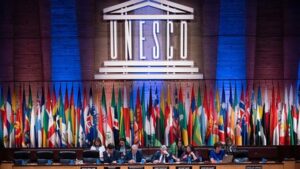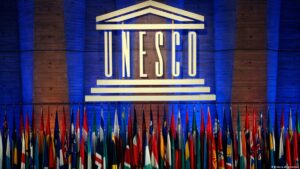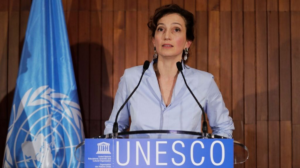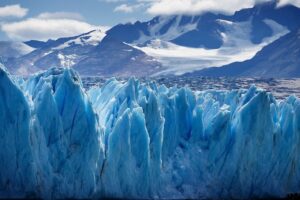
19 Ukrainian sites have been added to UNESCO’s International List of Cultural Property under Enhanced Protection, bringing the total number of Ukrainian sites on the list to 46, according to Deputy Prime Minister for Humanitarian Policy and Minister of Culture of Ukraine Tatyana Berezhnaya.
“The UNESCO Committee for the Protection of Cultural Property in the Event of Armed Conflict has just supported Ukraine’s initiative and adopted a corresponding decision. This is an important international victory and recognition of how responsibly Ukraine complies with international humanitarian law even during a full-scale war,” Berezhna wrote on Facebook on Thursday.
According to her, the total number of Ukrainian sites on the list has increased to 46. “This makes Ukraine one of the countries with the largest list of cultural heritage sites under the highest international legal protection in the field of humanitarian law,” the minister emphasized.
Berezhna noted that enhanced protection is the highest level of international legal protection provided for by the Second Protocol to the 1954 Hague Convention. Sites that receive this status must meet three key requirements: be of exceptional importance to humanity; be protected at the national level; and not be used for military purposes.
“In the context of full-scale Russian aggression, Ukraine has become the first country in the world to apply the mechanism of enhanced protection on a large scale during wartime, setting a new precedent in international practice,” the Minister of Culture emphasized.
According to her, it was also on Ukraine’s initiative that a discussion began last year on international legal responsibility for violating the immunity of objects under enhanced protection. The results of the study, conducted by a group of international experts, were presented during the 20th Session of the Second Protocol Committee.
The following sites were added to the Enhanced Protection List: Akkerman Fortress, Belgorod-Dnestrovsky, Odessa Region; Uspensky Cathedral, Kharkiv; Borisoglebsky Cathedral, Chernihiv; Kharkiv Academic Ukrainian Drama Theater named after Taras Shevchenko, Kharkiv; Church Building (St. Paul’s Church), Odessa; L.E. Kenig’s Estate: Palace (Main House), Trostyanets, Sumy Region; Molchansky Monastery, Putivl, Sumy Region; Pokrovskaya Church, Kharkiv; Primorsky Staircase, Odessa; Voskresenskaya Church, Sumy; Kirillovskaya Church, Kiev; Spaso-Preobrazhensky Cathedral, Sumy; Troitsky Cathedral, Sumy; The site of the chronicle city of Iskorosten, Korosten village, Zhytomyr region; The archaeological complex “Ostrov Baida,” Zaporizhia; Odessa Museum of Western and Eastern Art, Odessa; Odessa National Art Museum, Odessa; Odessa National Scientific Library, Odessa; Museum of Carpathian Art, Ivano-Frankivsk.
“Violating the ‘immunity’ of such sites is a serious international crime and entails double responsibility – both for the state and for individuals,” Berezhnaya noted.
Berezhna expressed her gratitude to UNESCO for its support of Ukraine, to Deputy Minister of Culture Anastasia Bondar, as well as to Lina Doroshenko and the entire team for their work. “I would also like to thank my colleagues from the Ministry of Foreign Affairs of Ukraine / MFA of Ukraine for their coordinated work,” she added.

The Ministry of Culture and Information Policy states that UNESCO is stepping up its support and will actively monitor the situation in Ukraine.
“Recently, at UNESCO headquarters in Paris, during its 219th session, UNESCO has decided on actions and an emergency assistance program for Ukraine. From now on, the Director-General of UNESCO will actively monitor the situation in Ukraine within its internationally recognized borders in order to ensure UNESCO’s direct participation in the restoration of Ukraine within the framework of the Organization’s mandate,” the Ministry’s press service said.
It is noted that the decision provides for the Director-General of UNESCO to actively monitor the situation after the Russian Federation blew up the Kakhovka hydroelectric dam, and the monitoring should result in the preparation of an action plan to overcome the negative environmental consequences of this ecocide.
In addition, at the session, the Director of Strategic Planning of the UNESCO Secretariat presented a report by the Director-General of UNESCO on the measures taken to implement the UNESCO Program of Action and Emergency Assistance to Ukraine.
According to the document, UNESCO has mobilized over $66 million to help Ukraine.
“The delegations reaffirmed their readiness to continue financial support for UNESCO’s programs for Ukraine in certain areas, in particular for the protection of cultural heritage sites in Odesa, Kyiv, Lviv and other cities, and called on UNESCO to continue to mobilize resources to restore the Organization’s mandate in Ukraine. The statement of the Group of Friends of Ukraine at UNESCO in support of Ukraine with a strong condemnation of Russian aggression was announced by the UK delegation on behalf of 44 states,” the statement reads.

UNESCO Director General Audrey Azoulay has arrived in Ukraine, First Deputy Foreign Minister of Ukraine Emine Japarova said.
“As the head of the National Commission of Ukraine for UNESCO, I am honored to welcome Audrey Azoulay to Kiev. The visit of the UNESCO Director General is a huge sign of support for our efforts to protect and restore culture, education, science, youth, sports and media in Ukraine. These issues are on the agenda today,” she wrote on Twitter.

The traditional French bread loaf – baguette – at the meeting of the 17th Intergovernmental Committee of UNESCO was registered in the representative list of Intangible Cultural Heritage of Humanity.
The committee voted unanimously to recognize the artistry and culture of the baguette.
“A great pride,” commented Dominique Henract, chairman of the National Confederation of French Bakery and Confectionery, who was present at the vote.
On such an occasion, the government’s reaction was not long in coming. The Minister of Culture, Rima Abdul-Malak, pointed out the importance of this “emblem of French cultural heritage.” “In its various forms, traditional or reinvented by our artisans, the baguette has set the rhythm of French daily life – morning, noon and evening – for several centuries and has been exported to many countries,” she said.
The Minister-Delegate for Small and Medium Enterprises, Commerce, Crafts and Tourism, Olivia Gregoire, welcomed the “recognition of the baguette-making culture, which we must preserve and protect to ensure the transmission of this heritage.

UNESCO has published data on the status of fifty glaciers included in the World Heritage List. And these data clearly indicate their accelerated melting.
Glaciers in the Dolomites, the Mont Perdu in the French Pyrenees, the Yellowstone and Yosemite glaciers in the United States, the glaciers of Africa on the UNESCO list – these are some of those that will disappear by 2050, experts say.
They estimate that even if you stop emitting CO2 and take radical protective measures, such as those being discussed at UN climate conferences, such as the COP27 world meeting in Egypt in November, the melting seems already irreparable.
“The situation is bad for mountain glaciers. Worse than for the polar ice caps of Greenland and Antarctica,” says Marie Cavite, a glaciologist at the Catholic University of Leuven in Belgium.
She explains that in the optimistic scenario for all the world’s glaciers by 2100, the estimated loss ranges from 22% to 57% “depending on the regions and the measures taken.” “But if you have the glaciers of the Alps in mind specifically, 94% of them will be gone by 2100,” says the glaciologist.
The heat of 2022 was particularly killer for these alpine glaciers, she says. Temperatures in the summer, as elsewhere in Europe, were much higher than usual. There was little snow cover in the spring, whereas snow is a protective blanket for glaciers: before the ice starts to melt, the snow has to melt.
And in addition to this, the third negative factor, very specific to the Alps, Marie continues, is the traces of a sandstorm from the Sahara that reached Europe. “Sand, unlike snow, is dark, and the ice heats up faster underneath it,” notes the glacier researcher. The confluence of these circumstances this year, she explains, is what led to this unprecedented melting.

A UNESCO technical delegation will visit Kyiv this week, said Assistant Director General of UNESCO for Priority Africa and External Relations Firmin Eduard Matoko.
“We are planning to send a technical mission to Kyiv with the government of Ukraine this week to further assess the needs and expectations of the Ukrainian authorities and determine the forms of our participation. UNESCO expresses its readiness, together with all partners, to provide technical support in our areas of competence and support the plan for the restoration and development of Ukraine “, Matoko said at a conference on the restoration of Ukraine in Lugano on Tuesday.
He noted that UNESCO regularly monitors the impact of the war on cultural sites, damage to educational institutions, and also the safety of journalists and media workers.
“We protect cultural heritage with satellite monitoring and equipment to protect and stabilize objects,” Matoko said.
According to him, UNESCO is also mobilizing support to ensure continuity of learning for all citizens of Ukraine, supporting online learning in and outside Ukraine, as well as the integration of refugees – students and teachers – into host countries.
He added that since the beginning of the war, UNESCO has been able to mobilize about $5 million for agreements with donor countries in these areas.